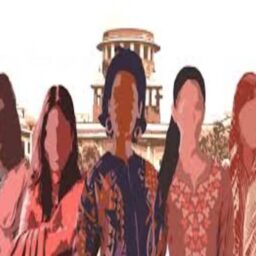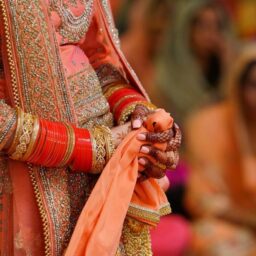INTRODUCTION
Hindu Marriage Act provides us the laws which hold the marriages Void, voidable, or Valid. According to Hindu Law, marriage is not just a bond between the spouses; it is considered an Institution in itself. In India, For Example, if a bride and groom elope from their house and decide to marry in a temple by exchanging garlands only, this will render their marriage voidable. The ceremony of Saptapadi (revolving around the holy fire seven times) is considered the auspicious ceremony in the Hindu marriage, and without which, marriage is not complete.
Over the years, the rise in divorce cases is visible. The remedy as Restitution of conjugal rights has proved to be a savior in many cases but has also been unconstitutional in some cases. Questions arise in our mind that is this remedy to the decree of marriage an invalid one?
WHAT IS RESTITUTION OF CONJUGAL RIGHTS?
In a basic sense, the term means to restore the conjugal (married) rights of either party to their original status. As per section 9, “When either the husband or the wife has, without reasonable excuse, withdrawn from the society of the other, the aggrieved party may apply, by petition to the District Court, for restitution of conjugal rights and the court, on being satisfied if the truth of the statements made in such petition and that there is no legal ground why the application should not be granted, may decree restitution of conjugal rights accordingly[1].” Here society is referred to as cohabitation (living together).
The burden of proving the reasonable excuse for withdrawal shall be on the person who has withdrawn from the society of the spouse.
The spouses are entitled to the other spouse’s support, love and compassion. If any spouse, without giving any reasonable explanation/excuse as to why they want to leave the other spouse, then, in that case, the latter can move to the Court for invoking their conjugal rights. In the Hindu, Christian, and Parsi personal laws, the Restitution of conjugal rights is regulated by statutory provisions.
The reasonable excuse that must be stated for withdrawal from the society of the other would be:
- If there exists a claim or a legal ground on which the respondent can claim any matrimonial relief.
- In a case where the petitioner is guilty of any marital misconduct, not amounting to the ground for matrimonial relief, yet grave enough.
- If the petitioner is guilty of some act, omission, or misconduct, the respondent can’t live with the petitioner.
This Matrimonial remedy is available to both spouses.
CONSTITUTIONALITY OF RESTITUTION OF CONJUGAL RIGHTS
A question arises on the constitutionality of the Restitution of conjugal rights when one party has left the society of the other; then, if the other party invokes the Restitution and if the spouse has left the society of the other, they may be forced by the Law to live together. Doesn’t this violate the fundamental right of personal liberty of the other party who wanted withdrawal? Sometimes, the Restitution of marital rights meddles with the freedom of expression, association, and other freedoms guaranteed under article 19.[2]
For instance, when a spouse is forced to stay with their other against their will, it violates Article 19(1)(c) of the constitution. The High Court of Bombay also stated in Bai Jivi vs. Narsing Lalbhai[3] that when a wife is forced to return to her husband against her will, it causes a psychological restraint on the individual.
Article 21 is one of the most important fundamental rights enshrined in the constitution. Besides protecting life and personal liberty, it also guarantees Individual Dignity,[4] which means a person’s right person to be valued & respected for their personality. An individual’s privacy is an essential part of personal dignity, in the case of T. Sareetha v. Venkata Subbaiah[5] (the wife, Ms. Sareetha, who was studying in high school, was sixteen years old when she was married to Venkata Subbaiah. Almost after their marriage, Sareetha left Venkata’s home and started to stay with her parents for more than five years and more. Therefore, Venkata filed a petition under section 9 of the Hindu Marriage Act, 1955, seeking remedy provided by Law.
Sareetha filed a revised petition against the orders passed by the learned subordinate Judge of Cuddapah court. Sareetha, in her petition, had raised the issue regarding the constitutional validity of sec 9 of the Hindu Marriage Act and stated that the section is violative of articles 14, 19, and 21. The Restitution of conjugal rights offends the guarantee of life and personal liberty and human dignity and decency.
To answer these questions of validity, Justice P.A. Choudhary stated that “a decree of restitution of conjugal rights thus enforced offends the inviolability of the body and the mind subjected to the decree and offends the integrity of such a person and invades the marital privacy and domestic intimacies of such a person.” It is generally interpreted by section 9 that sexual intercourse between the spouses is an integral part of cohabitation. But it is not. It is not the state or Law’s decision to force the woman to have intercourse with her husband. It is the sole discretion of the individual to have marital intercourse or only cohabit with the spouse with or without marital intercourse. Justice Choudhary touched a new area of privacy. Breaching this integrity and having forceful consensual intercourse violates the individual’s privacy because the body is private.
Coming to the part of violation of article 14, Justice Choudhary held that “Bare equality of treatment regardless of the inequality of realities is neither justice nor homage to the constitutional principle.” The Honorable Judge cited a case of America’s Supreme court to establish that sexual intercourse and procreation are fundamental to the wife’s right to privacy. The Judge observed that there are no State Interests to justify sacrificing an Individual’s right to privacy.
In some cases, the Restitution of conjugal rights was violative of the rights of human dignity enshrined and promised under Article 21[6]. Section 9 of the Hindu Marriage Act was also repudiated, as it failed the classification test of minimum rationality. Section 9 also offends the rule of equal protection of laws, thus violating Article 14.
Thus, the Andhra Pradesh high court observed that the remedy of Restitution of conjugal rights violates the right to privacy and human dignity guaranteed by article 21 of the constitution.
Soon after that, in the case of Smt. Harvinder Kaur v. Harminder Singh,[7] wherein the appellant Harvinder Kaur was married to Harmindar Singh. Both the spouses were employed. A few years later, the child was born out of wedlock. The wife left the society of her husband. Because of that, the husband brought a petition seeking the Restitution of conjugal rights. The Judge passed the judgment in his favour. The wife appealed before the High Court of Delhi, questioning the constitutional validity of Section 9, and claimed that the decision passed violates Articles 14 and 21 of the constitution.[8]
The honourable Judge stated that in most cases where the applicant seeks the remedy of Restitution, there is no sincerity in the applicant’s intention. A mala fide motive uses this remedy for other purposes besides reconciliation. Section 13(1A) (ii) of the Hindu marriage act states that “if a decree of Restitution is not respected for one year, then the parties can seek a divorce.” He said that Section 13 is based on the proceedings followed by section 9. If sec 9 is held constitutionally invalid, then sec 13 also becomes null and void which means, neither Restitution nor divorce under sec 13. Therefore, the Court held that that remedy under section 9 might be outdated but not unconstitutional. Based on these reasonings, the learned Judge dismissed the wife’s appeal and stated that section 9 is NOT unconstitutional as to what was said in the T. Sareetha case.
CONCLUSION
Some may argue that this remedy protects the institution of marriage from failing. Still, in some cases, it may violate the fundamental rights of the spouse to withdraw from the society of the other. A reasonable ground has to be established for the withdrawal, but there can be facts where the reason is invisible and cannot be proven. Under such circumstances granting the remedy of Restitution for reconciliation shall prove dangerous for the spouse who had withdrawn herself earlier. These things are still unclear, and the existing laws do not guarantee safety, rendering it dubious and uncanny under those circumstances.
Author(s) Name: Avik Ghose (Xavier Law School, Xavier Institute of Management University, Bhubaneshwar)
References:
[1] Hindu Marriage Act 1955, s 9.
[2] Mayank Gupta and Ojaswa Pathak, “Restitution of Conjugal Rights: An Infamous and Futile Matrimonial Remedy”, Vol. 6, GNLU Law review, <https://bit.ly/2WBHxRl> 22nd August
[3] Bai Jivi vs. Narsing Lalbhai, (1927) 29 BOMLR 332, AIR 1927 Bom 264.
[4] Paras Diwan, Modern Hindu Law, 24th Edition, 2019.
[5] T. Sareetha v. Venkata Subbaiah, AIR 1983 AP 356.
[6] The Constitution of India, art. 21
[7] Harvinder Kaur v. Harminder Singh, AIR 1984 Delhi 66.
[8] Jus Dicere, Harvinder Kaur vs Harvinder Singh, <https://www.jusdicere.in/harvinder-kaur-v-harmander-singhchoudhary/#:~:text=In%20this%20landmark%20judgement%2C%20while,restore%20the%20sacred%20marital%20relations> 22nd August 2021.
















